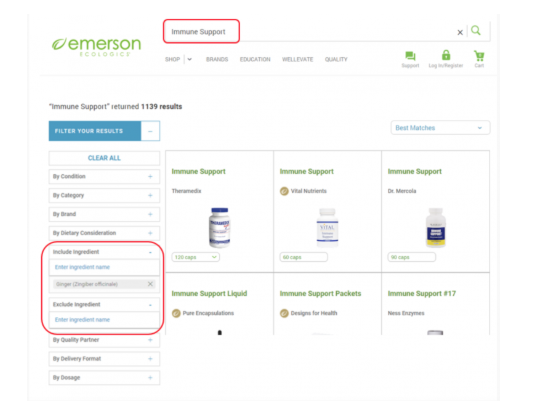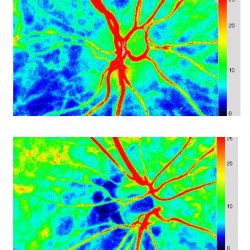 Kim Stewart
Kim Stewart
Emerson Ecologics’ New Personalized Product Search Tool
It’s all about personalized nutrition, so why shouldn’t your product searches be any different? That’s exactly why we like Emerson Ecologics’ new personalized search tool capability on their website. Here is how it works: 1. Start with the search bar or drop-down menu, type in or select a product category,Read
Attenuation of Natural Killer T-Cells with Cystine and Theanine
Men who perform resistance training 3 times a week for at least 6 months tend to have lower T-helper cell counts than non–resistance trained men. In addition, the natural killer (NK) cell count, an index of innate immunity, has been shown to decrease below the resting value after submaximal resistance exercise in both resistance-trained and non–resistance-trained men. It is a common hypothesis that resistance training impairs the immune system rather than enhancing its functions. This study examined the affects of cystine and theanine on NK cells, inflammation and immunity. By Shigeo Kawada, Kando Kobyahi, Masaru Ohtani and Chiho Fukusaki, published in J of Strength and Conditioning Research, Vol. 24, No. 3
Practice Model: Nutritional Program for Rheumatoid Arthritis
Men’s Health Sheds Fills Health Gender Gap
Marriage is good for men’s health, according the the latest National Health Interview Survey. It’s not surprising that spouses encourage men to see the doctor more frequently than they would otherwise. But what about men who are not married but living with a partner? They are even less likely than other non-married men to see a physician for preventive health care. Short of a marriage license, the way to get more men to pay attention to their health may lie in a novel approach that appeals to males desires to be useful, give back and be a part of club. In Australia, these are called Men’s Health Sheds, and they could provide a way to improve men’s physical and mental health.
Group-dietary Intervention and Gestational Weight Gain Among Obese Women
A new study finds that women who are obese can limit their weight gain during pregnancy using conventional weight-loss techniques, including attending weekly group support meetings, seeking advice about nutrition and diet, and keeping food and exercise journals. Results of the Healthy Moms study, published in Obesity, also show thatRead
Infrared Light Irradiation on Retinal Artery, Vein Blood Flow & Atherosclerosis-inducing Factors
In this small pilot study, published in Integrative Medicine Research (Dec. 2017), researchers evaluated the influence of pinpoint plantar long-wavelength infrared light irradiation (stress-free therapy; SFT) on chorioretinal hemodynamics (retinal artery and vein blood flows) as well as its influences on atherosclerosis-inducing factors (triglycerides; TG, low-density lipoprotein cholesterol; LDL-C, high-densityRead
Integrative Psychiatry Effective but Overlooked for Cancer Patients
Nearly three-quarters of cancer patients who have major depression are not currently receiving treatment for depression, and that a new integrated treatment programme is strikingly more effective at reducing depression and improving quality of life than current care, according to three papers published in The Lancet Psychiatry, The Lancet, and The Lancet Oncology. Lead author Professor Michael Sharpe from the University of Oxford in the UK, says “The huge benefit that DCPC delivers for patients with cancer and depression shows what we can achieve for patients if we take as much care with the treatment of their depression as we do with the treatment of their cancer.” By M Sharpe, et al., published in the Lancet and Lancet Oncology, Aug. 2014.
Hispanic Men Most Affected by Diabetes Epidemic
Close to half (40%) of the adult population of the USA is expected to develop type 2 diabetes at some point during their lifetime, suggests a major study published in The Lancet Diabetes & Endocrinology. The future looks even worse for some ethnic minority groups, with one in two (> 50%) Hispanic men and women and non-Hispanic black women predicted to develop the disease. A team of US researchers combined data from nationally representative US population interviews and death certificates for about 600 000 adults to estimate trends in the lifetime risk of diabetes and years of life lost to diabetes in the USA between 1985 and 2011.
Breastfeeding & Intestinal Microbiota in Infants
Put the Script Pad Down: FDA’s New Drug Approvals Pose Significant Risks
For every 100 new drugs introduced in the market, there have been 34 withdrawals or new black box warnings in the past 25 years. Since 1992, FDA sped up the pace and approval process for pharmaceutical companies willing to pay a fee. Approval time was cut in half, but with it came a significant number of safety withdrawals and warnings. This study, released today in Health Affairs, shows the expeditious process has placed millions of Americans at risk, essentially making them unwitting members of safety trials after the drug was approved.














